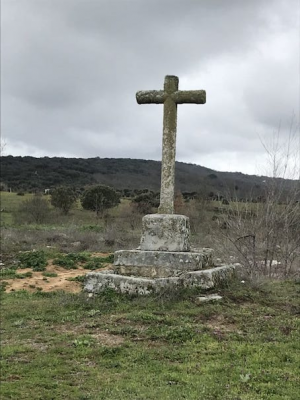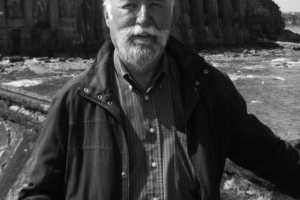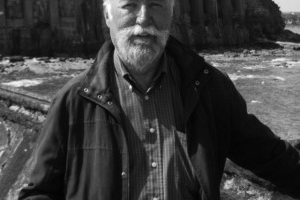Reflection: 'Between the Cross and the Resurrection' John Sherrington CP

To all intents and purposes, by that ninth hour of that Friday before the feast of Passover began, the Jerusalem hierarchy and oligarchy, i.e. the religious and civil powers, had won. They, the opponents of Jesus of Nazareth, had disposed of a problem from Nazareth by means of publicly executing him by crucifixion: culturally and socially the most shameful of deaths known, a death that epitomised failure at every level, being regarded as cursed by God and man.
At one stroke his insignificant group of followers were scattered: the "disciples" on the road to Emmaus, "apostles" petrified in an obscure upper room in the capital; disheartened, diminished, and defeated. What could they achieve?
No hope, no future, insignificant numerically, what could they possible organise, they couldn't even constitute cohort! Were they not a spent force, if they had ever been a force at all? What could they possibly achieve?
This motley bunch had challenged the system, the status quo, the" old ways" the powers that be, by contravening canons and conventions , sacred and secular, social, cultural and political: consorting with tax collector ,sinners of all kinds, women and men of low repute, shepherds and lepers, beggars, the lame and the deaf, the dumb and the mad - all the rejects and miscreants of any "decent" civilised society. What could they achieve?
All "no hopers" the world of Jesus' followers, their hopes, and expectations would to all intents and purposes seem blown asunder. What could they achieve?
The disciples on the Road to Emmaus, personify the depth of disappointment: "we had hoped that he….. (Jesus) was the one who would set Israel free" Lk 24:21; they treat with scepticism the women in their group talking about a vision of angels at the tomb of Jesus! Anyway, the two disciples on the road saw no future (nb. "their faces downcast" Luke 24:17.).
Preoccupied with themselves and their disappointments they fail to recognise Jesus being alongside them. It was only when they asked him to stay with them, and in sharing the meal, that they recognised him in the breaking of the bread, their eyes were opened, they said "did not our hearts burn within us as he talked to us on the road" Luke 24:32;
Are we not also on this road, where we walk with the sorrowful and dejected of this world; the poor and the powerless those cast aside to the margins of life in whom Christ continues to suffer? ("when you did it to the least of these my brethren you did it to me" Matthew. 25:31- 40 ;), Again in Acts 9:3-5; Jesus' words to Saul on the road to Damascus "Why do you persecute me?"
Do we listen to them as Jesus listened to the woes of the two disciples on the road? Do we express solidarity with them ("heartfelt concern", "existing-with, "accompanying") as the Lord did? As we walk with them do we recognise Jesus in them walking with us? Do we hear the Good News announced to us, the scriptures interpreted for us?
He stayed with them; the dejected, the failed, to share with them, to be-with? He made himself dependent on them,("it was almost dark, he made as if to go on, they pressed him to stay") how important this was and is because it was through this "staying-with" that the "hidden Christ" revealed himself to them in the sharing of the meal.
Like the two disciples on the road we also learn as we go along, we do not have a blueprint with everything set down for us. We are changed by the Crucified One and crucified ones of our world, and through them, we are challenged to reinterpret our lives in favour of them.
The Cross of Jesus is transformative. It is not a justification or canonisation of suffering. It transforms those who have eyes to see and ears to hear e.g. one of the two crucified with him, the centurion in charge of the execution, those who in Mark's account of the Passion "go away beating their breasts". In John's account, Mary the mother of Jesus being given the "beloved disciple" to care for, and for him to care for her (Jn. 19:26-27;) whilst in Mark we also have Joseph of Arimathaea " a prominent member of the Council boldly went to Pilate and ask for the body of Jesus" and in John we have Nicodemus along with Joseph burying the body of Jesus. They who previously had been secret disciples bravely associate themselves with the "failure" and "damned" Nazarene. We must remember they did not know before the event that Jesus would be raised by the Father from the dead.
God chooses what is considered weak in the world's eyes to confound what the world thinks is strong; God's foolishness is wiser than human wisdom and God's weakness is stronger than human strength. 1Cor 1:25ff.
Paul also reminds us, and the early followers of Jesus, that God chose them many of whom were not highly regarded by the world's standards, "God chose the weak to shame the strong, the common and contemptible, those who counted for nothing to reduce to nothing all those considered to count for something".1Cor 1:26ff). God's choice continues to challenge us, to be with those that the world counts as nothing .So, here we are proclaiming a Crucified Christ, we witness to his passion as it continues in our day in women and men at Sites of Suffering, our modern day Calvary. We witness to a Crucified Christ, in a crucified humanity, on a crucified planet.
These sites of suffering take many forms but are invariably marked by exploitation, exclusion, marginalisation, and the image and works of God are defaced.
One such "site of suffering" is our inner cities, which by the world's standards count for nothing. Life is a constant struggle for people who feel left behind, and like the Asylum-Seeker and, the refugee, have lost their history, and there is no future.
Regeneration is a costly business and not likely to happen quickly and the usual mode of regeneration where it has occurred, entails the exclusion, disenfranchisement, dislocation and relocation of the resident community, so that "those who count for something" the economically and socially successful can benefit.
Until such happens, many continue to be plagued by ill health and impoverished life-styles. There is an over preponderance of people with walking aids, not just the elderly. There are those who are chronically obese, whilst at the other end of the spectrum those who are and undernourished and look old before their time, especially younger men. Much of which is owing to pecuniary and precarious existence. Being that not many can get out, it is important that we are there, between the Cross and the Resurrection.

















